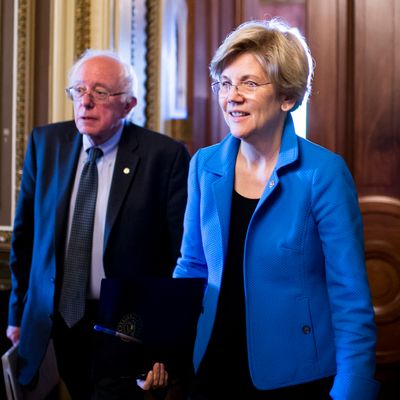
The much-anticipated latest edition of Ann Selzer’s gold-standard Iowa Poll (for the Des Moines Register, CNN, and Mediacom) of the recently under-surveyed First-in-the-Nation Caucus State showed the four leading national candidates tightly bunched and in a position to do well. In first choices among likely caucusgoers, Bernie Sanders leads with 20 percent, followed by Elizabeth Warren with 17 percent, Pete Buttigieg with 16 percent, and Joe Biden with 15 percent. Compared to the last Iowa Poll in November, Sanders has gained 5 percent and Warren one percent; Biden is exactly where he was; and Mayor Pete — the November leader — has lost nine points. When you add in second preferences (important in Iowa because caucus supporters of candidates who fall short of a 15 percent viability threshold in any one location are then reallocated in a second vote), Warren has 33 percent, Sanders 32 percent, Buttigieg 31 percent, and Biden 27 percent.
The close nature of the contest confirms what CBS/YouGov indicated in the only other Iowa survey since mid-December, which had Biden, Buttigieg, and Sanders in a literal tie, with Warren seven points back.
The results are obviously good news for Bernie Sanders, who has been getting a lot of it lately, and arguably even better news for Elizabeth Warren, who hasn’t. It’s the first state or national poll in a while where she’s actually made gains from autumn polling. And aside from confirming the strength of her well-regarded Iowa organization, it indicates she doesn’t seem to have aroused the kind of doubts about her policies and her electability that are bedeviling her elsewhere. Her favorability/unfavorability ratio is best in the field (70/24).
It’s also good new for these two senators that they are in good shape in Iowa shortly before an impeachment trial may take them off the campaign trail for weeks (except on late evenings and Sundays).
For Mayor Pete, his showing was hardly a disaster, but it’s the second day in a row when new early state polls showed him with sizable losses (Fox News polls in Nevada and South Carolina placed him at 6 percent and 4 percent, respectively). And while Biden stood pat in the Iowa Poll, the findings contradict the impression that he’s been slowly building strength everywhere.
The candidate who has to be most disappointed in this poll is Amy Klobuchar, who is at the same 6 percent (with a slightly higher 8 percent in second-choice support) she was in November, despite her well-regarded performance in the December candidates’ debate. Today a New York Times assessment of the race made a claim that she’d better hope is widely shared in the political media:
Political officials widely believe that there are five tickets out of Iowa this year, instead of the typical three.
A fifth-place showing isn’t a lock for Klobuchar; Andrew Yang got 5 percent in the Iowa Poll, which gave him a second qualifying poll for the January 14 debate in Des Moines. Unfortunately, that’s two short of what he needs, and midnight tonight is the qualifying deadline. Cory Booker, whose 3 percent is precisely where (or even above) he has been in Iowa Polls dating back to March, has never been able to capitalize on his initially strong organization in the state. And the heavy early state TV investments of yesterday’s big poll winner, Tom Steyer (who made the Des Moines stage with double-digit showing in those two Fox News polls of Nevada and South Carolina) hasn’t seen to impress Iowans; he’s at 2 percent in the Selzer poll, down a point from November.
A lot of observers are placing emphasis on this finding from Selzer:
I would ingest that with a grain of salt. Iowans take their first-in-the-nation responsibilities seriously, and may not admit they’re certain if there’s any doubt. In addition, 2016’s binary choice between Clinton and Sanders was not remotely as much of a head-scratcher as this still-large field.
Still, there is indeed some history of late precaucus turbulence in Iowa, as Steve Kornacki points out:
So a lot of movement remains possible in a place where retail politicking matters a great deal, while caucus-night organization matters most.






























